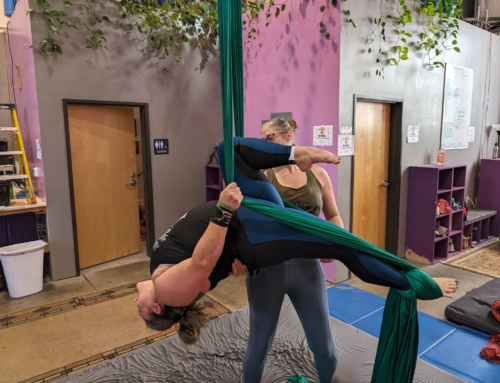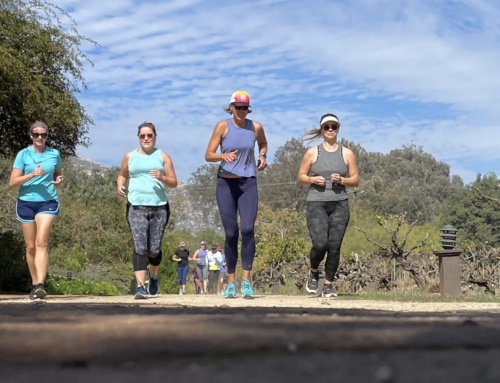Welcome to our first ever week dedicated to a professional (and accessible and inspirational) #motherrunner! Yesterday, Tish Hamilton talked about Deena’s recent book, Let Your Mind Run and the lovely Deena took over @TheMotherRunner Instagram account.
Today, we’re running an excerpt of Let Your Mind Run; we picked this one because, like most of the book, it’s helpful and easy to integrate on so many levels: your state of mind impacts everything from the miles you run to the smile you give—or don’t give—the grocery store cashier. Even if you don’t want to hang on to a pack of men doing mile repeats, Deena’s wise words are worth absorbing.
Tomorrow, we have a giveaway of some of Deena’s favorite Asics gear—and a few copies of her book—queued up, so be sure to check back then. Until then, enjoy!
My practical application [of thinking positively] began in earnest after reading The Power of Positive Thinking by Norman Vincent Peale. Peale was a pastor in New York City who often sprinkled his sermons with ideas on perspective. Most of the literature on positive thinking at the time—1952—was academic. Peale’s book offered real-life anecdotes and practical tools, helping to popularize positive thinking. His advice on staying focused on “today”—the moment right in front of us—reinforced Coach’s refrain of giving one task your full attention. Peale wrote about the effects of word choice on our perception, which encouraged me to look at words that frequented my vocabulary: “hard,” “cold,” and “tired.” Replacing those words with “challenging,” “tough,” and “adapting” provided a greater feeling of strength and purpose.

“Our happiness depends on the habit of mind we cultivate.”: Norman gives Deena an a-ha moment
As I read, a passage jumped out: “Our happiness depends on the habit of mind we cultivate.” I highlighted the sentence and put three exclamation points in its margin. I saw so clearly that Coach had the habit of a positive attitude. In repeatedly telling me to bring a good attitude to practice, he was trying to instill the same in me. Habits are developed through repetition, so instead of focusing on my attitude periodically, I set out to make thinking positively a practice.
The next morning, I noted that I usually woke thinking about how heavy my body felt and slogged through the kitchen making coffee half-asleep. I only woke up mentally after taking Aspen outside. So the following morning, I replaced thoughts of fatigue with Let’s take Aspen out. My energy shifted right away. By pulling my attention away from sleepiness and on to a task, I was already more alert. Outside, instead of standing on the porch with my arms crossed waiting for Aspen, I noticed the crispness of the morning and the light coming up. Back inside, I was alert in the kitchen. I added a dash of cinnamon to the coffee grounds, enjoying the process and pleased at having turned a previously mundane task into something pleasurable.
In practice, I began consciously experimenting with my thoughts and their effect on the workout. My hamstrings tended to fatigue, which annoyed me. It took me a moment to become aware of the irritation, but when I did, I asked myself how else I could view it. I’m gaining strength where I need it. Good, I thought, and ran on, emboldened by the idea of getting stronger.
Every Thursday we had repeats at Cole Park. When I lost contact with the men, I noticed my mind drew a quick conclusion: I’ll never be able to hang on. This surprised me because I actually liked the workout. I flipped the thought to I’m a little closer to Phil today, and again felt an immediate energy shift. The negative thought had been weighing down my stride with doubt and disappointment. The positive thought had created lightness, and the confidence and desire to keep pushing.
I’d gotten a sense of this interplay as a kid. When people said I was a “phenom,” I felt a buzz. When someone referred to my win as a fluke or said I’d burn out quickly, I felt slighted and sad. I’d experienced the feelings connected to these comments when I was young. But only after experimenting with positive thoughts as a professional did I realize how the nature of my thinking influenced the quality of my running. Each time I shifted my attention away from something negative and put it on something positive, I felt my body loosen, my stride open up, and my confidence rise.
I began making connections beyond training. I noticed how an argument on the phone with my mom was followed by a bad work- out. A fast mile-repeat session came on the heels of exciting news about a friend getting married. Perfecting my cinnamon-roll recipe on Friday had me running light on my feet on Saturday.
Suddenly, I noticed all sorts of small moments in my life when negativity popped up. At the café, when one of the regulars, Wade, walked in, I reacted with, Oh no, not Wade. Wade was grumpy and unfriendly. He never looked up from his paper, even when I came to take his order, which he then barked at me. I walked over to his table bracing myself for his assault and carefully asked if he would like coffee. Now, I realized I’d let him condition me into approaching the situation with dread. So the next time he came in, I walked over and said good morning. He grumbled and ordered pancakes. When Pops rang the bell, I ran to the back and drew a big whipped cream smiley face on top of his pancakes. I walked the plate over to Wade and placed it in front of him. I got a crooked grin.
I left the café that day lighter, feeling good about having made the effort to be kind. I started my workout in a more positive and up- beat mood, and when the tough part came—frustration at fatigue, disappointment at a slower mile—I found a positive perspective to get me through it. I am pushing my limits. I am stronger than I was yesterday.
It wasn’t just workouts that improved. The positive shifts built on one another. The whole day became more productive and enjoyable and I moved through it with greater ease. So I kept experimenting. When someone snagged the parking spot I had my eye on at the grocery store, I dispelled my irritation with: The next spot will be closer. Or, maybe I’m supposed to walk the lactic acid out of my legs. Whining about being too tired to cook dinner became It’s a good night for takeout. An achy calf turned into an appreciation for rest. If a foreigner didn’t leave me a tip at the café, I reminded myself tipping wasn’t customary in their culture, and walked over and poured Wade more coffee.
Does your perspective scale naturally tip more towards positive or negative?
If it’s the former, how did it land there?
If it’s the latter, do you actively work on transforming it?
[[Adapted from LET YOUR MIND RUN Copyright © 2018 by Deena Kastor. Published by Crown Archetype, an imprint of Penguin Random House LLC.]]







She defines my sense of spirituality–choosing to be positive, choosing to be happy. It’s a reminder we are not the victim of life, or the weather, or somebody else’s success. Thanks so much for this excerpt.
LOVE this! I aim to choose the positive path, but recognize I don’t always make that choice, but what a difference it makes when I do. Thank you for this great reminder, which I will also be passing along to my kids!
Let your mind run has been my go-to audiobook for running. This exert and that quote is the moment Deena’s book changed MY thinking.
I definitely try to be positive and find the good in each situation I am put in. However, being everyone’s cheerleader can be exhausting.
I tend to be positive, I love to cheer others on and pace races. If I’m feeling negative, I really look deep, either I need a rest day, or a run. My body always tells me what to do, I just need to listen!
I’ve been struggling with my long runs as my buddies leave me towards the end (I haven’t been able to hang on) I’m going to change my thinking for the next long run and use the positive thoughts.
This excerpt came at the perfect time. I’ve been in a bit of a slump lately, and while I realized much of it is my own attitude it was great to read Deena’s efforts to overcome the negativity. I wasn’t always negative, so I know I can get my groove back.
Love it! Running to the bookstore now!
I had this on my library list, but I think I just might need to bite the bullet and buy myself a copy. I’m training for a marathon right now, and just this little excerpt is right on time and relevant for me.Thanks, Deena!